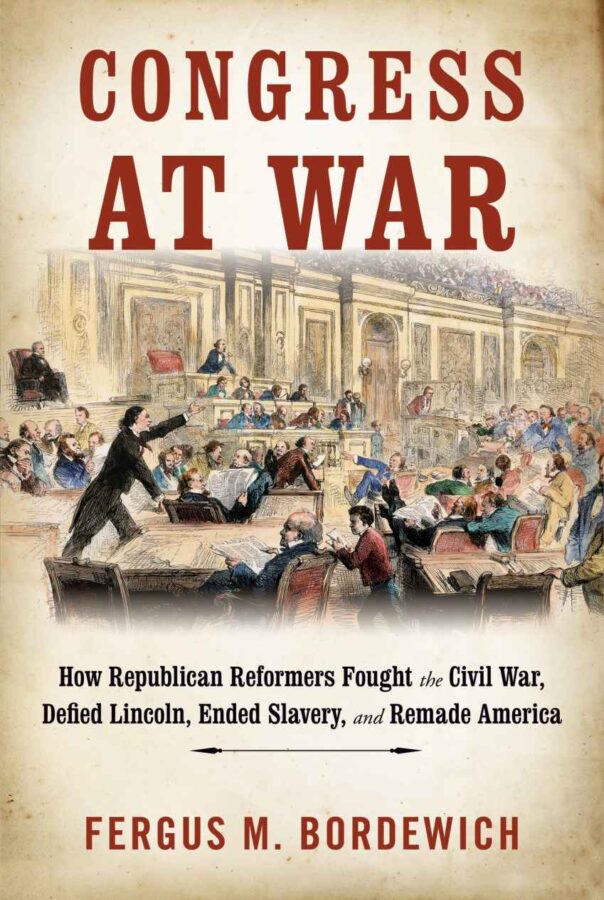Congress at War: How Republican Reformers Fought the Civil War, Defied Lincoln, Ended Slavery, and Remade America by Fergus M. Bordewich. Alfred A. Knopf, 2020. Cloth, IBSN: 978-0451494443. $32.50.
 The history of Civil War politics has often been focused on Abraham Lincoln’s statesmanship, management of his feuding Cabinet, and ability to steer the country towards emancipation. Fergus M. Bordewich refocuses attention on the legislative branch, retelling the story of the Thirty-Seventh and Thirty-Eighth Congresses. The preface contains a paean to the legislative branch’s importance: after all, Congress financed the war, raised the armies, and provided the legislation that influenced the country’s future direction. Bordewich focuses on Congressmen Thaddeus Stevens of Pennsylvania and Clement Vallandigham of Ohio and Senators William Pitt Fessenden of Maine and Benjamin Wade of Ohio. Stevens and Wade were Radical Republicans, Fessenden a conservative Republican, and Vallandigham an anti-war Democrat. Bordewich doesn’t explain the rationale for these selections: why two Radicals and no War Democrat?
The history of Civil War politics has often been focused on Abraham Lincoln’s statesmanship, management of his feuding Cabinet, and ability to steer the country towards emancipation. Fergus M. Bordewich refocuses attention on the legislative branch, retelling the story of the Thirty-Seventh and Thirty-Eighth Congresses. The preface contains a paean to the legislative branch’s importance: after all, Congress financed the war, raised the armies, and provided the legislation that influenced the country’s future direction. Bordewich focuses on Congressmen Thaddeus Stevens of Pennsylvania and Clement Vallandigham of Ohio and Senators William Pitt Fessenden of Maine and Benjamin Wade of Ohio. Stevens and Wade were Radical Republicans, Fessenden a conservative Republican, and Vallandigham an anti-war Democrat. Bordewich doesn’t explain the rationale for these selections: why two Radicals and no War Democrat?
Bordewich begins with James Buchanan’s last Presidential Message, which failed to provide decisive leadership during the secession crisis. Much of the narrative will be familiar to students of the Civil War with overviews of military events and of Lincoln’s actions and policies. The narrative does shift attention, however, away from the presidential branch towards the legislative. Readers will encounter discussions of how Congress counted a quorum with the southern states absent and other arcane congressional procedures. Stevens chaired the House Ways and Means Committee and Fessenden the Senate Finance Committee (after Salmon P. Chase’s resignation, Fessenden briefly became Secretary of the Treasury), so there is much discussion of the effort to finance the war through increased taxes and bond sales.
Although the legislative branch frequently acted merely to ratify actions Lincoln had already taken, Congress passed the first conscription law in the United States (the Confederacy had enacted a draft law the previous year). Wade chaired the Committee on the Conduct of the War, providing congressional oversight of the war effort and a bête noir for many generals. Vallandigham, Bordewich argues, might have gone down in history as a champion of civil liberties akin to Eugene V. Debs in World War I if his opposition to the war had not been tainted by racism and sympathy with the Confederacy.
Bordewich offers a brief overview of Reconstruction and the post-war careers of his protagonists: Stevens and Fessenden co-chaired the Joint Committee on Reconstruction, and the three Republicans all played leading roles in the impeachment of Andrew Johnson. Stevens, who had been ill during the impeachment, died in the summer of 1868. Fessenden died suddenly the following year, and Wade a decade later. Vallandigham, out of office since his defeat for re-election during the war, died in a freak gun accident in 1871.
Bordewich credits the congressional Radicals with moving more quickly toward expanding black rights, thus placing pressure for emancipation and voting rights on Lincoln. Congress abolished slavery in Washington, D.C,. and in the territories, repealed the Fugitive Slave Act, passed Confiscation Acts which included slave property, recognized the black-led governments of Haiti and Liberia, and established the Freedmen’s Bureau to help African Americans transition from slavery to freedom.
Congress at War, Bordewich suggests, is particularly relevant in this era of polarization, but this comparison seems strained. Congressional Republicans achieved a great deal during the Civil War, passing legislation such as the Pacific Railroad bill and the Homestead Act that had languished in pre-war congresses. Republicans passed a National Bank Act, overcoming resistance to a centralized banking system that had existed since at least the days of Andrew Jackson. But Republicans achieved this not because they overcame the polarization between parties or sections, but because secession emptied Congress of their most intransigent opponents—proslavery Southerners—who were simply not present to vote against them. There were still splits within the party and opposition from Peace Democrats such as Vallandigham. Bordewich is clear that many an important measure passed by the barest of majorities. Nonetheless, Republicans enjoyed a political ascendancy handed them on a silver platter by the secessionists. The situation does not seem comparable to today.
The narrative is enlivened by amusing anecdotes and quotations not just from the four principals, but from a wide variety of Civil War figures including Frederick Douglass, Mary Boykin Chesnut, George Templeton Strong, and many others. Engagingly written, Congress at War will be welcomed by a popular audience as well as scholars.
Nicole Etcheson is the Alexander M. Bracken Professor of History at Ball State University.

